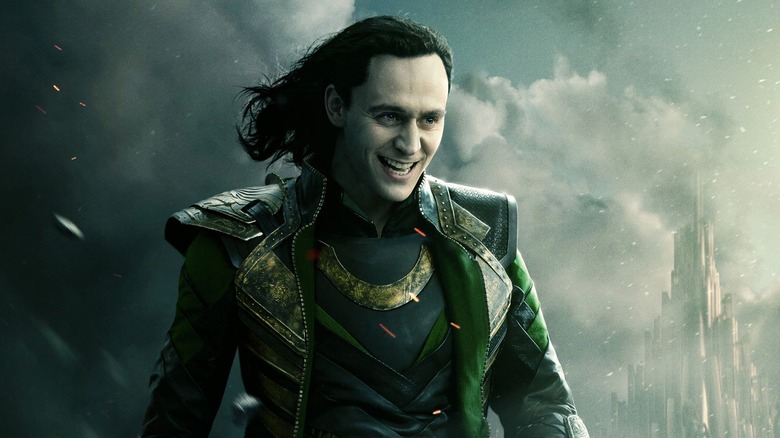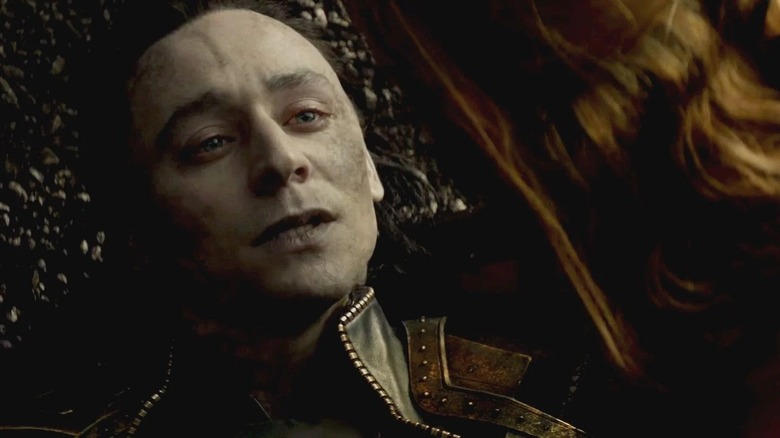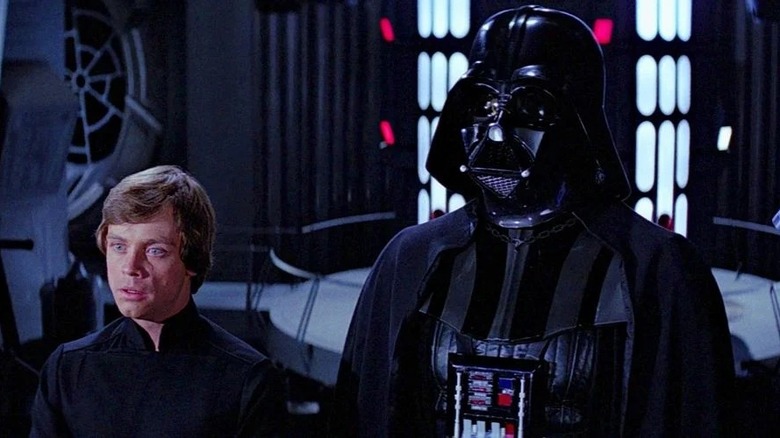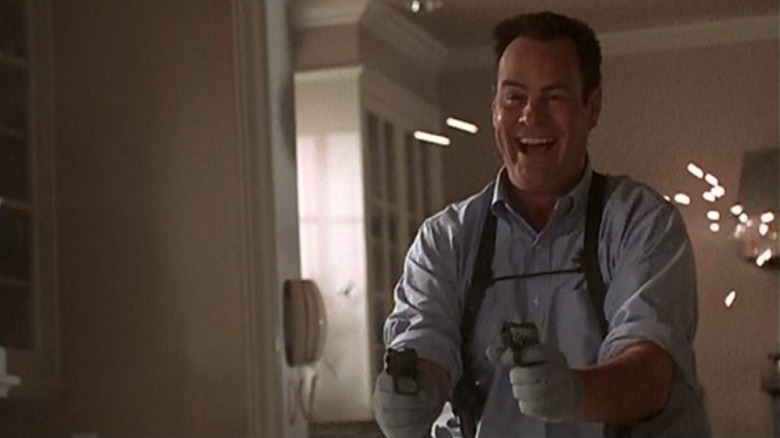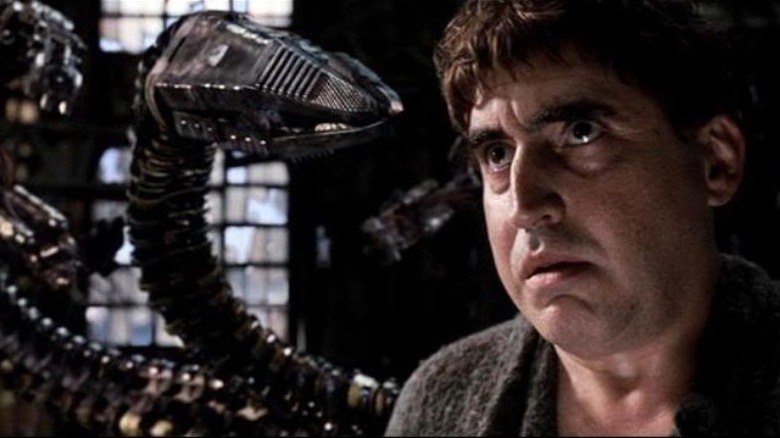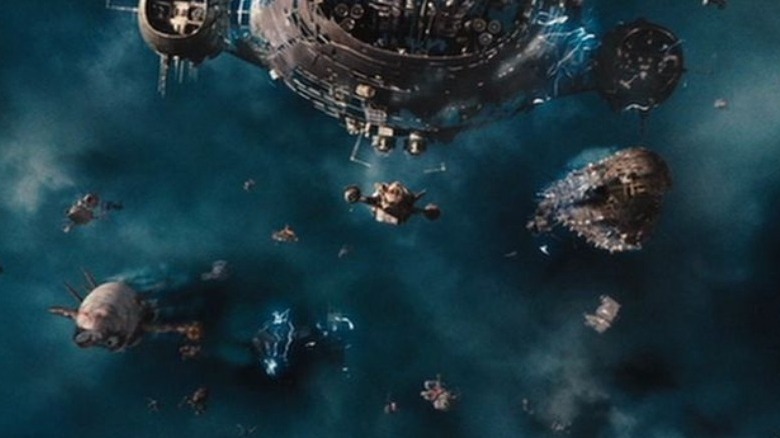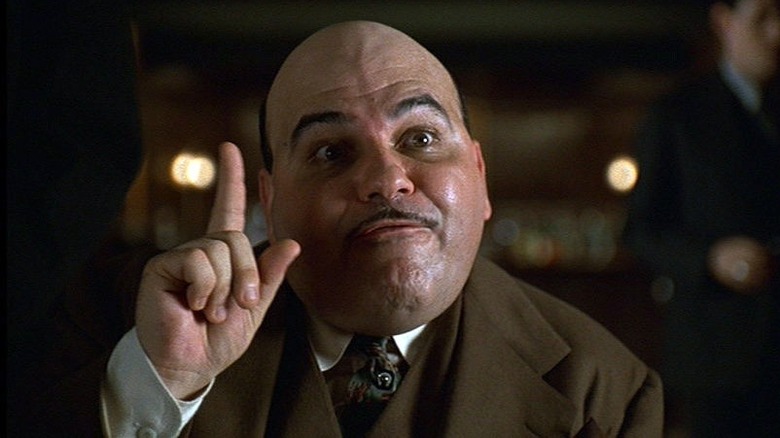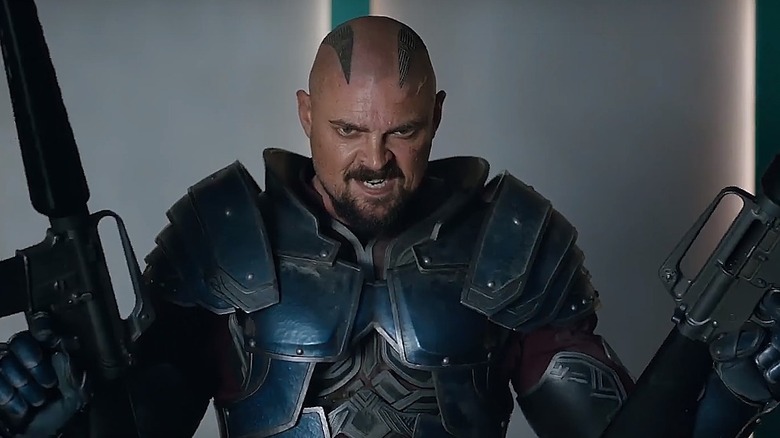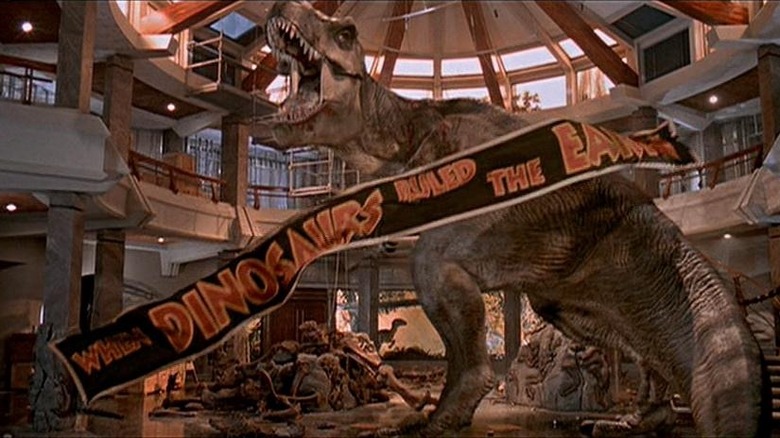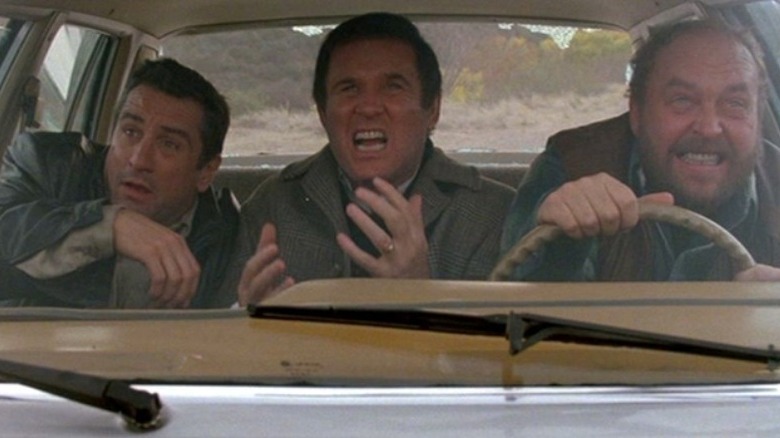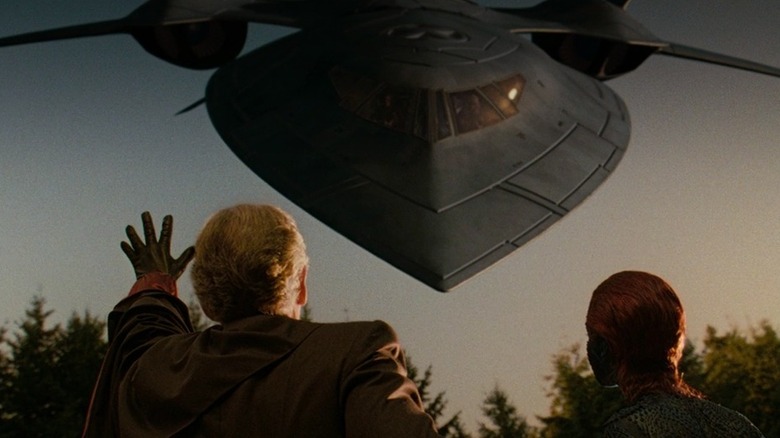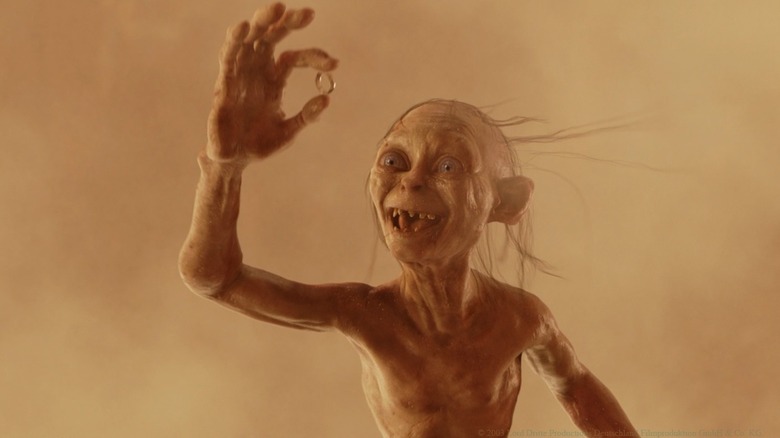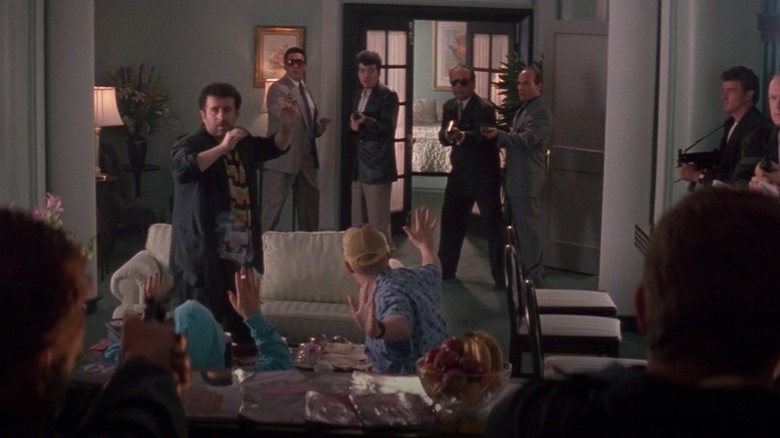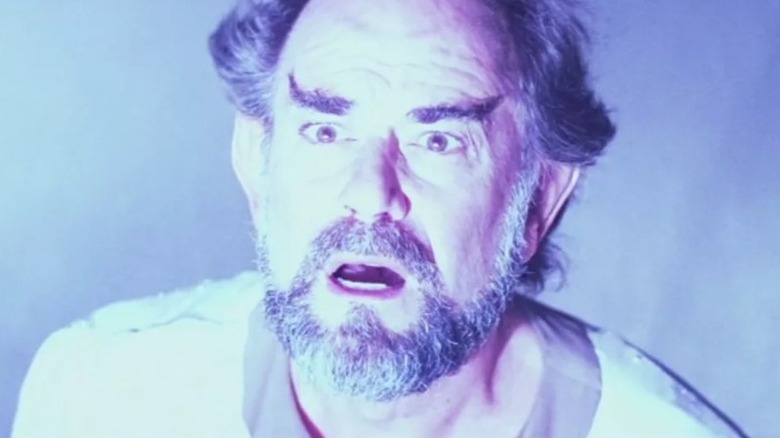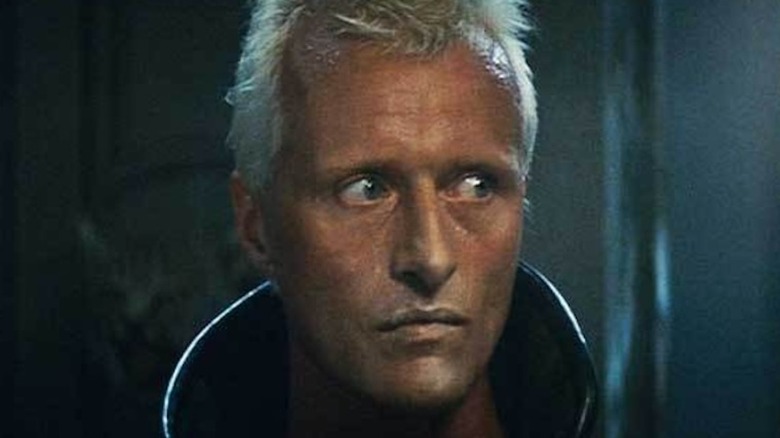Movie Moments Where The Bad Guy Saves The Good Guy
In Martin Scorsese's 2006 crime epic "The Departed," on the subject of whether to be a cop or a criminal, mob boss Frank Costello asks, "When you're facing a loaded gun, what's the difference?" In a similar vein, you might ask yourself, when you're hanging from the edge of a cliff and a hand reaches out to save you, do you care whether that hand belongs to a good guy or a bad guy?
We like to maintain impenetrable walls between our movie heroes and villains. We want to root for one side, and discovering moral failings in the good guy or heroic values in the bad guy can make us doubt our allegiances. It could even make us question the very notion of good guys and bad guys. That's never more true than when a character we're used to hating saves the one we see as the hero.
Whether it's for redemption, convenience, or just plain ol' dumb luck, here are some great movie moments when the bad guy saves the good guy.
Loki saves his brother in Thor: The Dark World
Few MCU characters undergo such radical evolution as Thor's half-brother Loki, and many fans would agree that Loki switched from supervillain to superhero a while ago. But in 2013's "Thor: The Dark World," he's still fresh from his mass murder in "Avengers." If nothing else is proof that he's still got a toe in the dark side, there's his aid to Kurse during the Dark Elf assault on Asgard and his subjugation of Odin at the end of the film.
But we still see a more heroic side to the trickster god in Svartalfheim, the Dark Elf world. When Thor attempts to destroy the Aether with his lightning, Loki rushes to shield Jane Foster from any harm. Moments later, when Kurse lobs one of the black hole grenades at the heroes, Loki nearly sacrifices himself to push Jane out of the way. Finally, when Kurse proves too powerful for Thor to handle alone, it's Loki's deceit that kills the Dark Elf after he secretly attaches a black hole grenade to the monster.
Darth Vader saves his son in Return of the Jedi
In 1983's "Return of the Jedi," Luke Skywalker rejects the repeated advice of Yoda and Obi-wan, who insist there is no salvation possible for Darth Vader. Luke willingly surrenders himself to Imperial forces, believing Anakin Skywalker is still alive within Vader. Vader brings Luke to Palpatine, and ultimately, Luke must once more duel his father, but this time, his victory nearly pushes him to the dark side.
In the end, Luke's faith in his father is redeemed. As Palpatine tortures Luke with force lightning, Vader looks back and forth between his son and the emperor, eventually choosing what no one expects but everyone prays for. Rather than let his son die, he lifts Palpatine from the floor and — battered by the emperor's lightning — hurls his former master down a long shaft.
In the end, Anakin not only saves his son but proves he really is the Chosen One the late Qui-gon Jinn knew he was so many years ago.
Grocer and Martin briefly team up in Grosse Pointe Blank
In the 1997 crime comedy thriller "Grosse Pointe Blank," hitman Martin Blank is harassed by Grocer, who wants to recruit Blank into his professional killer collective. Things between Blank and Grocer finally turn from tense to violent in the climax of the film, when Blank learns he's been hired to snuff the father of Debi, his high school sweetheart. He has no intention of making the kill, but he knows Grocer will be on his way to poach the contract from him.
In a bullet-riddled action sequence, Blank arrives at Debi's home and tears apart Grocer's thugs one by one until it's only him and Grocer left. In the middle of the final clash, two corrupt NSA agents burst into the house and begin firing indiscriminately. Blank and Grocer briefly turn their guns from each other to the agents, and together they mow the feds down. As the agents collapse, Grocer jokingly yells, "Workers of the world unite!"
Their alliance is short-lived, and Grocer dies when Blank buries his enemy's head in the guts of a television set.
Doc Ock saves the city in Spider-Man 2
In 2004's "Spider Man 2," Otto Octavius, aka Doc Ock, proves to be a much more sympathetic villain than his predecessor Green Goblin. After the robotic arms he initially uses only to aid him in his scientific pursuits are fused to his body, we learn the arms possess a malevolent intelligence which begins influencing everything Octavius does. Octavius is transformed into an obsessed monster who will do anything, including committing murder, to realize his scientific goals.
Thankfully, by the end of the film, Octavius is able to emerge from the arms' influence and redeem himself. In the climax, Octavius' experimental fusion reactor is going wild and endangering not only Spider-Man and Mary Jane but the entire city. Finally able to assert his dominance over the robot arms, Octavius uses them to save New York by plunging the reactor into the East River. The last we see of him, Octavius' seemingly lifeless body follows the reactor toward the bottom of the river.
The Reavers save the heroes in Serenity
Acting as a continuation to the story of the cult sci-fi favorite "Firefly," 2005's "Serenity" solves the mystery of how the vicious Reavers become the savage cannibals they are in both the series and the film. The Reavers, the heroes discover, were inhabitants of the planet Miranda, where an Alliance experiment gone wrong kills most of the population and turns the rest into Reavers. Malcolm Reynolds and his crew resolve to travel to the planet, where they can transmit the evidence of the Alliance's crimes, but there's an Alliance fleet in the way.
Seeing no other option, Mal orders the ship through Reaver space, where Serenity fires on a Reaver vessel and immediately speeds away. When Serenity appears before the Alliance fleet, the villainous Operative initially believes Reynolds has lost his wits, but then the Reaver fleet emerges following Serenity.
The Alliance and Reaver fleets clash, and Serenity manages to weave through to the planet below. The desperate plan works, but at a high cost. A Reaver ship follows Serenity to the planet, and shortly after Serenity crash-lands, her pilot Wash is killed.
A mob boss saves the hero from his right-hand man in Miller's Crossing
Long before they introduced us to The Dude of "The Big Lebowski," Joel and Ethan Coen gave audiences the 1990 gangster film "Miller's Crossing." Gabriel Byrne stars as Tom Reagan, a high-ranking adviser in the Irish mob who goes rogue when his boss starts getting edged out of business by his Italian rival, the unpredictable Johnny Caspar. Tom's risky gambit is a long con — confusing both friend and foe alike so he can win Caspar's confidence and destroy him from the inside.
Through sheer relentlessness, one person is able to sniff out Tom's game — Caspar's brutal right-hand man Eddie Dane, aka the Dane. Toward the end of the film, Tom is summoned to Caspar's home, where the Dane waits to murder him. At first, Caspar goes along with the Dane's plans, doing nothing as he chokes the life out of Tom. But just as Tom begins to fade, Caspar crushes the Dane's nose with a fireplace shovel, saving Tom and yelling that it was the Dane who double-crossed him. Minutes later, Caspar says to Tom, "Look at this, kid. Something I try to teach all my boys!" He strides over to his desk, gets a gun, and shoots the Dane in the head. His face shaking and smeared with blood, Caspar says, "Always put one in the brain."
Skurge sacrifices himself to save his people in Thor: Ragnarok
For much of 2017's "Thor: Ragnarok," Skurge isn't particularly impressive. Not only is he the only warrior at the Bifrost who doesn't lift a hand to stop Hela when she arrives in Asgard, but even after he becomes her so-called executioner, he pretty much just fields Hela's evil monologues and lets the army of the dead and Fenris do all the heavy lifting. In the final battle, rather than commit to either side, Skurge disguises himself and boards the refugee ship, hoping to escape.
However, after Hela summons one of her spikes to stop the refugee ship and her undead minions begin pouring into the vessel, Skurge finally finds his courage. He unveils his beloved rifles — Dess and Troy — and mows down the unliving soldiers before they can overtake the ship. Sacrificing his own escape for that of his brethren, Skurge leaps from the ship and fights off the army of the dead as the ship pulls away. Like his comic book counterpart's heroic last stand in 1985's "Thor" #362, Skurge ultimately dies for Asgard, as Hela kills him once she sees he's switched sides.
The T-Rex saves the heroes at the end of Jurassic Park
One of the most memorable scenes in 1993's "Jurassic Park" is the unveiling of the gargantuan T-Rex. After escaping her enclosure, she takes one of the first human victims of the film when she devours the lawyer Gennaro. She comes close to killing Hammond's grandkids when she nudges their car off a ledge and injures the chaos theorist Ian Malcolm enough to keep him on his back for the rest of the film.
But in the end, it's the T-Rex who proves to be the heroes' salvation. In the film's final act, Hammond's grandchildren are hunted by the deadly velociraptors in the visitor's center. Ellie and Grant do their best to help the children, but eventually, all four of them are trapped by two of the hungry beasts in the center's main room. Just as one of the raptors is about to strike, the T-Rex reappears, snatches it off the floor with its jaws, kills it, and begins eating it. As the second raptor attacks the T-Rex, the heroes take the opportunity to escape.
In Midnight Run, a rival bounty hunter saves the good guys
In the 1988 action comedy "Midnight Run," everybody wants to capture the fugitive accountant Jonathan Mardukas. The luckless bounty hunter Jack Walsh has Mardukas in custody for most of the film, but they're pursued by the FBI's Special Agent Alonzo Mosely, the mob, and rival bounty hunter Marvin Dorfler.
In Texas, Walsh and Mardukas are cornered by two mob goons. The heroes find an unlikely savior in the form of the brutal Marvin Dorfler, who knocks both goons out with the butt of his shotgun. Walsh has no intention of giving his bounty up to Dorfler, so he handcuffs himself to Mardukas and seemingly throws away the key. Dorfler loads them both into his car, and they soon find themselves pursued by a helicopter with a gangster sharpshooter on board.
Eventually things get desperate enough that Walsh convinces Dorfler to give him a gun, and the former takes out the chopper with a shot to the tail rotor. As Dorfler celebrates their salvation, Walsh sucker-punches him, knocking him unconscious.
Magneto saves his rivals from crashing in X2
In Marvel Comics, there have been plenty of instances of the X-Men's old enemy Magneto allying himself with his rivals, joining the team, or even leading them. The first time something like this happens in the film adaptations, however, is in the aptly named "X2: X-Men United."
After a confrontation with the Boston police turns violent outside Bobby Drake's home, the X-Men's Blackbird is pursued by a pair of fighter jets. By dialing her powers up to 11, Storm is able to get both pilots to eject but not before one of them fires off two missiles. Jean takes out one of the missiles with her telekinesis, but the second detonates close enough to the Blackbird to send it spinning to the ground below. As the jet drops, it inexplicably slows and finally comes to a halt mere feet from the ground.
From outside the jet, we see Mystique and Magneto, with the latter extending his arm and using his powers to keep the jet from crashing. As the X-Men begin to realize what's happened, Magneto jokes to Mystique, "When will these people learn how to fly?"
Gollum saves the world in Lord of the Rings
In 2001's "The Lord of the Rings: The Fellowship of the Ring," during the heroes' trip through Moria, Gandalf tells Frodo that in sparing Gollum's life years prior, "the pity of Bilbo may rule the fate of many."
The words prove prophetic more than once. First, in spite of Gollum's inevitable betrayal, Frodo and Sam would never have made it to Mordor without him. Second, in "The Two Towers" it's Gollum who rescues Frodo when the hobbit is mesmerized by the ghostly lights of the Dead Marshes and nearly drowns.
Finally, there's the destruction of the One Ring. When he finally makes it to Mount Doom, like the human Isildur so many years before, Frodo is overcome by the ring and decides to keep it. He puts it on, immediately drawing the attention of Sauron and his wraiths. It's only because of Gollum's timely intervention — chomping Frodo's finger off — that Sauron is defeated. In the struggle that follows, both Frodo and Gollum fall over the edge. While Sam saves Frodo, Gollum descends into the lava below, dying and taking the ring with him.
A 3-way shootout saves the heroes of True Romance
In the 1993 romantic crime drama "True Romance," things change in a big way for comic book store clerk Clarence and former escort Alabama when a combination of vigilante justice and dumb luck deposits a suitcase full of uncut cocaine in their laps. They manage to get wealthy movie producer Lee Donowitz to take the drugs off their hands for a hefty sum, and the deal takes place in an expensive LA hotel suite.
Unbeknownst to anyone else in the suite, Donowitz's assistant Elliot is working as an informant for the LAPD. Once the deal is finalized, the cops charge in, but Donowitz's private security guards refuse to stand down. The standoff gets more complicated when the mobsters who want their drugs back burst into the suite.
Surprisingly, the standoff turns violent because of the unarmed Donowitz. The producer goes wild when he realizes Elliot betrayed him and throws a tray full of hot coffee in his assistant's face. Detective Nicholson opens fire in response, and soon everyone is shooting. Elliot, Donowitz, all of Donowitz's security, all the cops, and almost all of the mobsters quickly die. One of the gangsters makes it as far as the hotel lobby, where he's gunned down by uniformed police. There are only three survivors.
Spock's brother saves the heroes in Star Trek V
While Sybok — the Vulcan who eventually is revealed to be Spock's half-brother — is the guy who puts the Enterprise and her crew in danger in 1989's "Star Trek V: The Final Frontier," it's also because of Sybok that the heroes manage to escape.
Sybok isn't like other Vulcans. Having become convinced that emotion, rather than logic, was the key to harmony and intent on recruiting others to his point of view, Sybok is banished from his homeworld. In between his banishment and the events of "The Final Frontier," Sybok is telepathically contacted by a being claiming to be God, who waits for him in the center of the galaxy beyond an energy field called the Great Barrier. Using his unique telepathic abilities, Sybok recruits an army he calls the Galactic Army of Light and seizes control of the Enterprise, eventually swaying much of the crew to his side.
When the Enterprise makes it through the Great Barrier, the powerful alien entity claiming to be God says it needs the Enterprise to escape the barrier. This inspires Captain Kirk to ask, "Why does God need a spaceship?" The alien attacks Kirk, causing Sybok and all of his loyal followers to realize they've been fooled. Sybok makes up for his mistake by using his telepathic abilities on the alien and distracting it long enough for the heroes to escape, sacrificing himself in the process.
Roy saves the man who hunts him in Blade Runner
The replicant Roy does some terrible things in the 1982 sci-fi classic "Blade Runner," but in the film's climax he chooses to save the life of Deckard — the hero who is not only hunting him but has already killed two of the three replicants who worked with Roy, including his lover Pris.
After Pris' death, Roy pursues Deckard through the Bradbury Building, knowing he only has minutes to live and presumably resolving to take Deckard with him. Deckard manages to escape the building to the rooftops but loses his gun in the process. Unarmed and facing the super-strong Roy, Deckard has no choice but to flee across the rooftops, but he's no Spider-Man. His jump is short on his way from one roof to the other, and he begins slipping from the opposite ledge. Rather than letting him fall, Roy easily leaps to the ledge, waits until Deckard finally loses his grip, and grabs the Blade Runner's wrist. With one hand, Roy lifts Deckard and deposits him to safety.
In his final moments, Roy tells Deckard about some of the amazing things he's seen in space, regretting that those moments will be "lost in time, like tears in the rain." Considering his words, it seems likely Roy chooses to save his opponent not out of forgiveness or any sudden surge of moral righteousness but because as a man seconds from death, he values life — even that of an enemy — more than vengeance.
